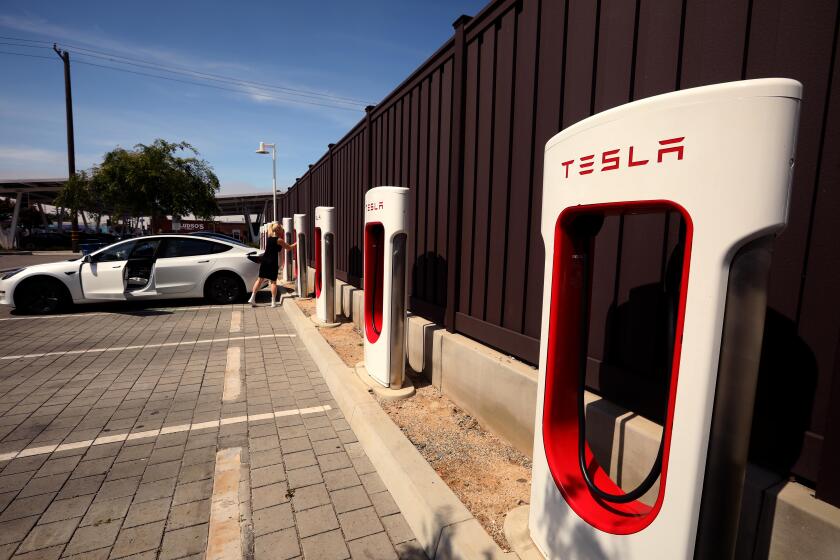With Sales Accelerating, Nissan Pursues Big Goals
Nissan Motor Co. is on a roll. Close to bankruptcy in 1999, Nissan last year passed Honda Motor Co. in global sales to become Japan’s No. 2 automaker -- though well behind Toyota Motor Corp.
In the U.S., Nissan’s largest market, the company is No. 6 and rising. Sales of its Nissan and Infiniti vehicles rose 17.9% last year and were up 28% through the first five months of this year, a pace no other major carmaker matched. Nissan Chief Executive Carlos Ghosn has set a goal to sell 1 million cars and trucks in the U.S. this year, an increase of about 25% from the 794,481 units sold in 2003. And globally, Nissan intends to climb from 3.2 million vehicles sold last year to 4.2 million in 2007.
One of the key executives with responsibility for accomplishing these tasks is Tokyo-based Steven Wilhite, 51, who late last year was appointed vice president of global marketing. Previously, Wilhite headed marketing efforts for Nissan North America Inc. in Gardena. Before joining Nissan, he worked as marketing chief for Volkswagen of America Inc. and Apple Computer Inc.
In San Francisco this month, Nissan is showing off its global product line to financial analysts and others. During the opening day of the two-week showcase, Wilhite discussed Nissan’s future, the global auto market and the effect of escalating oil prices.
Question: Sky-high fuel prices are big news in the U.S. What does this mean for Nissan, especially because you’ve just launched a full-size pickup, the Titan, and a large sport utility vehicle, the Armada, which are rated by the Environmental Protection Agency at just 13 to 14 miles per gallon in city driving?
Answer: Fuel efficiency is always a very important consideration, but our vehicles serve very specific purposes. And the purpose the Titan and Armada serve, unfortunately, requires engines that are not as fuel efficient as others that power much smaller vehicles. But if you are looking to build a full-size truck with full-size capabilities, then you pay a price in terms of fuel economy.
Q: Are there signs that buyers are turning away from larger vehicles because of escalating gas prices?
A: Well, we had a record month in May for both the Titan and Armada. We don’t see fuel prices making a big impact on sales. It’s a tough business, but we’ve predicted that total U.S. [industry] sales will be about 16.5 million this year [compared with 16.7 million in 2003], and I think that figure will hold. People need vehicles that can do certain things for them, and if the task requires a full-size pickup or SUV, then I think they will pay the price and buy one.... [But] I think that as the price of fuel rises, some of the emotional decisions will be moderated by rational considerations. So the woman driving a big SUV to make a 30-mile one-way commute every day in L.A. might say, “Wait a second! I’m going to look at a different kind of vehicle for my daily transportation.”
Q: A lot of diesel-powered vehicles and small gasoline cars that Nissan sells in Europe and Asia are on display at this event. Are some of them coming to the U.S. to help with fuel efficiency?
A: Ghosn has already said he’d like to make the Cube [a small vehicle with a boxy shape similar to that of the Honda Element and the Toyota Scion xB] a global car to sell in the U.S. The [high-performance] Skyline GTR is another, and beyond that I think I’d better keep my cars a little close to the vest.
Q: One fuel-efficient alternative is the hybrid, the gas-electric-powered vehicles that are catching on in California. Nissan plans to sell an Altima Hybrid in the U.S. in 2006. But you’ve been slow to get into the game and are licensing Toyota’s hybrid technology rather than developing your own. Why?
A: The struggle for us is to make sure we continue to be a leader in technology development while remaining profitable. From a financial perspective, the hybrid at this point is not nearly as profitable [because of modest sales] and doesn’t create nearly the value for shareholders, employees and stakeholders in the company that our other products do.
Q: How about diesel-powered cars in the U.S.? VW sells a couple of new, fuel-efficient diesels here, and you make them for the Asian and European markets. But Nissan has no plans to sell a diesel model in the U.S. Why?
A: Diesel technology ... is wonderful technology, very fuel efficient, and it plays a critical role around the world. I believe that the U.S. [market] rejects it for passenger cars because of a very bad experience with [poorly made] diesels in the 1970s that has biased consumers. No American manufacturer has taken it upon itself to challenge the expectations that consumers developed from those experiences ... even though diesel technology today is extraordinary and represents a real value for the consumer.
Q: Let’s talk a little about Nissan’s global goals, especially in China, where the car market is exploding.
A: Well, in a few years we expect to be selling ... 500,000 [vehicles] a year in the Chinese market.
Q: That’s impressive. But some analysts are beginning to question whether China’s soaring economy is sustainable. Do you agree?
A: I don’t believe the world has ever seen circumstances like those in China today. They have 1.3 billion people and they have to generate millions of new jobs each year to keep their economy going. We’ve invested more than $1 billion in a joint venture to build cars there.
I don’t know what they are capable of doing over an extended period, but I do know it is a tremendously vibrant and dynamic market. There aren’t any historic models we can use to judge where they are going. But we are very bullish and enthusiastic.



